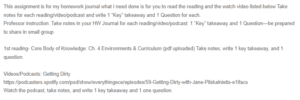Insights on Integrating Nature and Support in Early Childhood Education
1st Reading Notes
- Incorporating experiences with nature into the early childhood curriculum helps children to follow their natural sense of inquiry, hence being able to discover the world around them.
- Interaction with the natural environment helps children to grow not only their cognitive development but also aids in social skills development and relationship building. Notably, when children interact with their environment, they can understand how social interactions aid learning (Bornfreund & Hogan,2017).
- Integrating environmental studies into early childhood learning helps children learn about other cultures, values, and beliefs, fostering inclusion.
- Children should be taught the importance of understanding, acknowledging, and respecting other’s values, beliefs, and traditions at a younger age. This way, they grow to understand the importance of embracing and accommodating others as a way of building peaceful coexistence.
- Core body of knowledge: New York State’s core competencies for early childhood educators (2012) assert that including aspects of the environment in curriculum development fosters a sense of community by encouraging interactions based on empathy, connectedness, and responsibility. This can be achieved by putting children in groups to build visual connections with others.
Takeaway
- Nature-based education in early childhood development boosts children’s cognition, mood, and social skills. However, to achieve this goal, educators should incorporate aspects of nature that support positive learning and development in children.
Question
- How does nature-based learning shape the learning of children as they grow up?
Video Notes
- The success of any early childhood educator depends upon the ability of institutions to support teachers to provide the best experiences for young children (Ward, 2022).
- Carla Ward believes that it is important to create unique learning spaces for the children to stabilize the Early Education System.
- Another aspect of the video is about documentation in early childhood education, which entails collecting, interpreting, and reflecting on traces of learning, which helps to determine areas children have understood and those they have not.
Takeaway
Investing in the workforce is the first determinant of a successful early childhood education.
Question
Why is it important for early childhood programs to adhere to state standards?
References
Core body of knowledge: New York State’s core competencies for early childhood educators (3rd ed.). (2012). . NYC Early Childhood Professional Development Institute.
Ward, C. (Host). (2022, May 13). Getting Dirty (No. 59) [Audio podcast episode]. In The Everything ECE Podcast. Early Learning Foundations. https://podcasters.spotify.com/pod/show/everythingece/episodes/59-Getting-Dirty-with-Jane-Pilskalnietis-e1ifacs
ORDER A PLAGIARISM-FREE PAPER HERE
We’ll write everything from scratch
Question 

Insights on Integrating Nature and Support
This assignment is for my homework journal what I need done is for you to read the reading and the watch video listed below Take notes for each reading/video/podcast and write 1 “Key” takeaway and 1 Question for each.
Professor instruction: Take notes in your HW Journal for each reading/video/podcast: 1 “Key” takeaway and 1 Question—be prepared to share in small group
1st reading- Core Body of Knowledge: Ch. 4 Environments & Curriculum (pdf uploaded) Take notes, write 1 key takeaway, and 1 question.
Videos/Podcasts: Getting Dirty
Watch the podcast, take notes, and write 1 key takeaway and 1 one question.